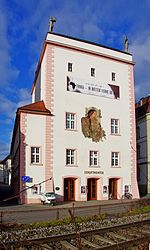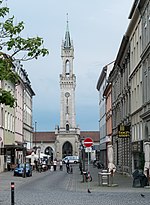Konstanz University of Applied Sciences
The Hochschule Konstanz (Hochschule Konstanz für Technik, Wirtschaft und Gestaltung (HTWG)), is a German university located in Konstanz, Baden-Württemberg, Germany, in southern Germany close to the border with Switzerland. The university is a member of Internationale Bodensee-Hochschule (International Lake Constance University). The Hochschule Konstanz plays a significant role among German universities of applied sciences. It is internationally well known for its outstanding achievements. The Hochschule Konstanz was named 2006 as one of the best German Universities of Applied Sciences in higher education (HE). Its undergraduate courses in business are consistently ranked in the top 15 in Germany.The university was established in 1906 by Alfred Wachtel and named the "Technicum Konstanz", meaning Technical School of Constance. Initially there were only three departments: engineering, technical studies, and the school for 'Werkmeister' - post graduate work.
Excerpt from the Wikipedia article Konstanz University of Applied Sciences (License: CC BY-SA 3.0, Authors).Konstanz University of Applied Sciences
Alfred-Wachtel-Straße, Verwaltungsgemeinschaft Konstanz
Geographical coordinates (GPS) Address Website External links Nearby Places Show on map
Geographical coordinates (GPS)
| Latitude | Longitude |
|---|---|
| N 47.6671 ° | E 9.17176 ° |
Address
HTWG Hochschule für Technik, Wirtschaft und Gestaltung (FH Konstanz;HTWG)
Alfred-Wachtel-Straße 8
78462 Verwaltungsgemeinschaft Konstanz, Konstanz-Altstadt
Baden-Württemberg, Germany
Open on Google Maps










